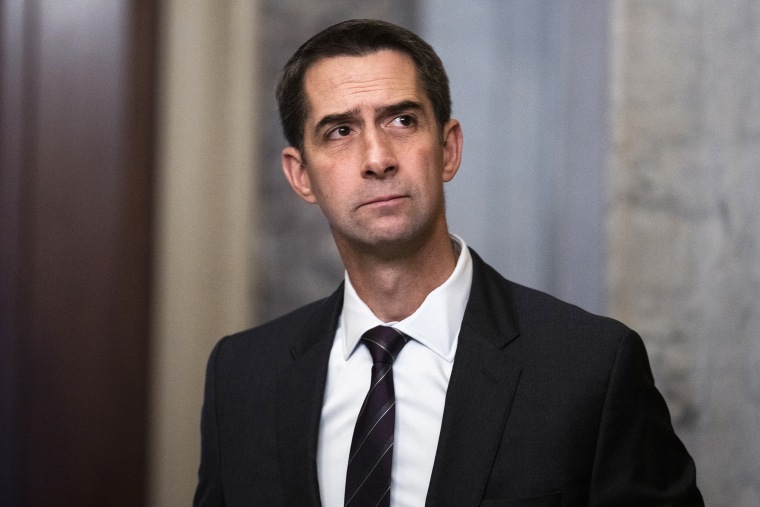WASHINGTON — Senators in both parties voiced frustration after they left a closed-door briefing Wednesday with National Intelligence Director Avril Haines, who declined to show them copies of the classified documents discovered at Donald Trump’s Mar-a-Lago resort and Joe Biden’s office and Delaware home.
Haines also refused to discuss the sensitive material, citing ongoing special counsel investigations, according to members of the Senate Intelligence Committee who attending the classified briefing.
Sen. Tom Cotton, R-Ark., was so furious after the briefing that he threatened to block presidential nominees or funding for some federal agencies until the Biden administration shows key lawmakers the classified documents.
“Whether it’s blocking nominees or withholding budgetary funds, Congress will impose pain on the administration until they provide these documents. And that is coming from both parties,” Cotton told reporters.
“I’m prepared to refuse consent or to fast-track any nominee for any department or agency and to take every step I can on every committee on which I serve to impose consequences on the administration until they provide these documents for the Congress to make our own informed judgment about the risk to national security.”
Senators were told Wednesday that Biden administration officials cannot brief Congress about a damage assessment of the documents until the special counsels investigating the Trump and Biden documents give the green light.
The bipartisan leaders of the Senate Intelligence panel emerged together from the secure briefing room and rejected the administration’s argument.
That is “not a tenable position,” said Intelligence Committee Chairman Mark Warner, D-Va. “What I think the director heard is she didn’t just hear it from Sen. Rubio and I. Literally every member of the committee, without exception, said this won’t stand.”
Sen. Marco Rubio, R-Fla., the committee’s vice chair, called it a “very unsatisfying hearing.”
“The bottom line is this: They won’t tell us what they have until the special counsel allows them to tell us. That’s an unacceptable position,” Rubio said.
Warner and others pointed out that the Senate Intelligence panel received regular briefings on Russian interference in the 2016 election at the same time a special counsel was appointed to investigate the matter.
The senators argued that their committee has oversight responsibilities for intelligence matters and that they need to be able to assess whether the discovery of classified documents at Trump’s and Biden’s unsecure homes and office poses a threat to national security. On Tuesday, news broke that a lawyer for former Vice President Mike Pence had discovered about a dozen documents at his home in Indiana and had turned them over to the FBI.
“We’ve got a job to do, and we’re going to do it,” Warner said.
Another committee member, Sen. John Cornyn, R-Texas, said there is “a lot of concern” about Haines and other intelligence officials’ deferring to the Justice Department on deciding who gets access to the recovered classified documents.
“Typically, in a criminal investigation or a law enforcement investigation, we wouldn’t want to talk about that to protect the integrity of the investigation and the rights of the person being investigated,” said Cornyn, a former Texas attorney general.
“But here, there are larger concerns, public safety concerns, national security concerns that make this an exceptional case.”
Wednesday’s briefing with Haines had not been scheduled to focus on the documents; it was one of the regular updates she gives the Intelligence Committee. Haines made no public statements as she left the briefing in the sensitive compartmented information facility, known as the SCIF.
Lawmakers in both parties and in both chambers expressed worry and exasperation that the government’s system for labeling and tracking thousands of classified documents appears to be broken.
“It seems to be a problem that is unique to the executive branch, but we’ll figure it all out. It’s good that Americans are thinking about our national security,” said Sen. Lindsey Graham of South Carolina, the top Republican on the Judiciary Committee.
“I’m not saying anything bad about the three [Biden, Trump and Pence], but classified information in the wrong hands can create problems for our country, put people at risk. That’s why this stuff is important.”




